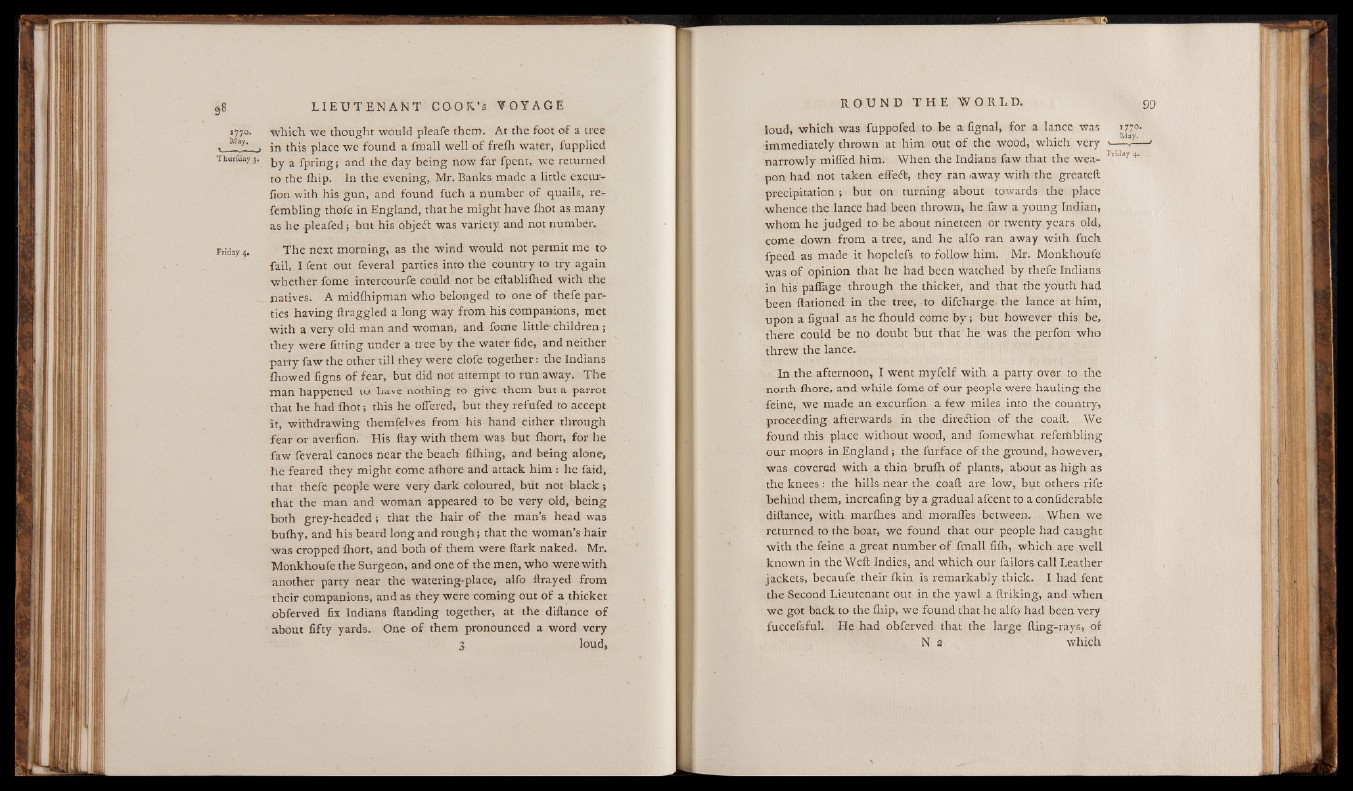
Thurfaay 3.
Friday 4.
•which we thought would pleafe them. At the foot of a tree
in this place we found a fmall well of frefh water, fupplied
by a fpringi and the day being now far fpent, we returned
to the fhip. In the evening, Mr. Banks made a little excur-
fion with his gun, and found fueh a number of quails, re-
fembling thofe in England, that he might have fhot as many
as he pleafed; but his objeft was variety and not number.
The next morning, as the wind would not permit me to
fail, I fent out feveral parties into the country to try again
whether fome intercourfe could not be eftablifhed with the
natives. A midlhipman who belonged to one of thefe parties
having ftraggled a long way from his companions, met
with a very old man and woman, and fome little-children ;
they were fitting under a tree by the water fide, and neither
party faw the other till they were clofe together: the Indians
Ihowed figns of fear, but did not attempt to run away. The
man happened to have nothing to give them but a parrot
that he had fhot; this he offered, but they refufed to accept
it, withdrawing themfelves from his hand either through
fear or averfion. His flay with them was but fhort, for he
faw feveral canoes near the beach fifhing, and being alone,
he feared they might come afhore and attack him : he faid,
that thefe people were very dark coloured, but not black;
that the man and woman appeared to be very old, being
both grey-headed; that the hair of the man’s head was
bufhy, and his beard long and rough; that the woman’s hair
was cropped fhort, and both of them were fiark naked. Mr.
Monkhoufe the Surgeon, and one of the men, who were with
another party near the watering-place, alfo Brayed from
their companions, and as they were coming out of a thicket
obferved fix Indians flanding together, at the diftance of
about fifty yards. One of them pronounced a word very
3 loud,
loud, which was fuppofed to be a fignal, for a lance was j77°-
immediately thrown at him out of the wood, which very •— ¥ -
narrowly miffed him. When the Indians faw that the wea- Fn ay +'
pon had not taken effeft, they ran .away with the greateft
precipitation ; but on turning about towards the place
whence the lance had been thrown, he faw a young Indian,
whom he judged to be about nineteen or twenty years old,
come down from a tree, and he alfo ran away with fuch
fpeed as made it hopelefs to follow him. Mr. Monkhoufe
was of opinion that he had been watched by thefe Indians
in his paffage through the thicket, and that the youth had
been Rationed in the tree, to difcharge- the lance at him,
upon a fignal as he fhould come b y ; but however this be,
there could be no doubt but that he was the perfon who
threw the lance.
In the afternoon, I went myfelf with a party over to the
north fhore, and while fome of our people were hauling the
feine, we made an excurfion a few miles into the country,
proceeding afterwards in the direction of the coafl. We
found this place without wood, and fomewhat referfibling
our moprs in England; the furface of the ground, however,
was covered with a thin brufh of plants, about as high as
the knees : the hills near the coafl are low, but others rife
behind them, increafing by a gradual afcent to a confiderable
diftance, with marfhes and moraffes between. When we
returned to the boat, we found that our people had caught
with the feine a great number of fmall fifh, which are well
known in the Weft Indies, and which our failors call Leather
jackets, becaufe their fkin is remarkably thick. I had fent
the Second Lieutenant out in the yawl a ftriking, and when
we got back to the fhip, we found that he alfo had been very
fuccefsful. He had obferved that the large fling-rays, of
N 8 which